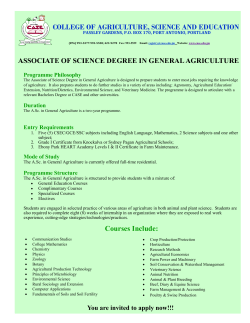
Time Tuesday, June 30th, 2015 Global and Regional
Tuesday, June 30th, 2015 Global and Regional Sustainable Development and the Environment Time 8:00 – 9:00 Registration 9:00 – 9:45 Opening Ceremony and Launch of the Andean Regional Network of the SDSN Rafael Correa Delgado, President of the Republic of Ecuador 9:45 – 10:30 Sustainable Development: Promoting economic growth within the planetary boundaries. We have entered the Age of Sustainable Development. While pursuing prosperity over generations, it is crucial to create a balance between social well-being, environmental protection and economic growth. Acknowledging that we must live within the limitations on this planet, each region has diverse challenges to address. From social, economic, and environmental standpoints, we must develop solutions to these challenges in order to ensure that national and regional development is sustainable and equitable for all. Jeffrey Sachs, Director of the SDSN, Director of the Earth Institute 10:30 – 10:45 Q&A 10:45 – 11:00 Coffee Break 11:00 – 11:45 Climate Change: Implications of human induced global warming. The global scientific community has recognized the fact that anthropogenic activities have enhanced global warming. Climate change is threatening our development in multifaceted dimensions. Human activities are increasing the risk of reaching the planetary boundaries and the tipping points that can be translated into a collapse of the natural environment, as we know it. Anders Levermann, Professor of Dynamics of the Climate System, Potsdam Institute for Climate Impact Research 11:45 – 12:00 Q&A 12:00 – 12:45 Agriculture: Agricultural systems and rural prosperity. Sustainable agricultural production, food security and hunger eradication are an important part of sustainable development. Adequate amounts of food are needed to feed a growing population. To meet this increasing consumption, agricultural systems need to be enhanced with better management and new strategies to increase productive capacity of farmlands. The majority of agricultural production is in rural areas. Developing all aspects of these rural agricultural systems, from soil management to distribution infrastructure, is a route to feed nations and boost rural prosperity in the future. 12:45 – 13:00 13:00 – 14:00 Q&A Lunch 14:00 – 15:00 Solutions Panel 1: Public Policy and the Environment Appropriate management of natural resources: water, oceans, and forests. Environmental legislations have proven to be essential for natural resource preservation. Water, oceans and forests provide indispensable services to our population. However, much stress is put on these services, which are often exploited, without consideration of the long-term negative implications to society, the environment, and the future economy. Effective legislation and management of these resources is necessary for long-term sustainability. Virgilio Viana, Director of the Amazonas Sustainable Foundation Yolanda Kakabadse, President of the World Wide Fund for Nature 15:00 – 16:00 Solutions Panel 2: Climate Change Mitigation De-carbonization of the economy. While climate change adaptation is already critical in many world regions and will be increasing in necessity in the short term, now is the time to implement climate change mitigation strategies and decrease human-induced detriments to the environment. De-carbonization of the economy may be a long and tedious process, but can and must be done. Rethinking urban space and systems, including transportation and infrastructure, is one strategy. Decreasing our reliance on fossil fuels is another. Moreover, effective legislation drives the development of new technologies, and can push the private sector to take responsibility for its impacts on ecosystem services. Manuel Pulgar-Vidal, Minister of the Environment of Peru Nathalie Cely Suarez, Minister Coordinator of Production of Ecuador Paul Baker, Professor at Duke University Susan Wood-Bohm, Executive Director, Biological GHG Management, Alberta Innovates 16:00 – 16:30 16:30 – 17:30 Coffee Break Solutions Panel 3: Agriculture Enhancing agricultural techniques: water, soils, and the role of GMOs. Given the increasing limitations due to climate change, water and soils pose challenges to agricultural production. Management of water systems and soil nutrients, along with GMOs are perceived as possible solutions to address these challenges and increase agricultural production. Building smallholder capacity to diversify farms and access credit may facilitate long term agricultural practices that increase yields and preserve soil. Jeffrey Lansdale, President of Zamorano 17:30 – 18:30 Poster Session 18:30 - 20:30 Reception
© Copyright 2025





















